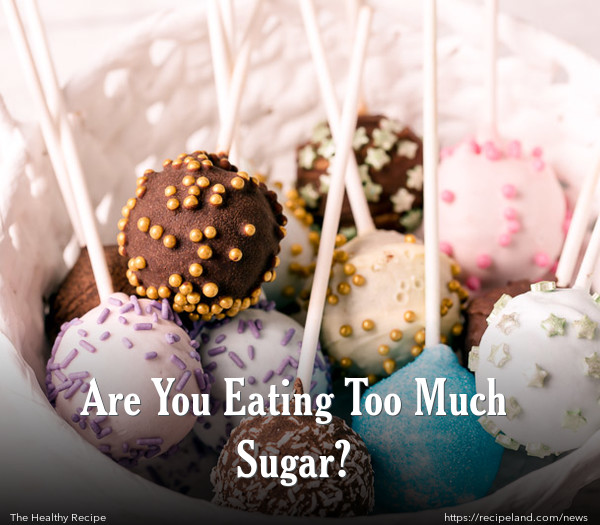Avoiding excess sugar is always a good idea, but you may still be eating more than you think. Learn about 10 signs that you need to cut back.
How much sugar should you limit yourself to? According to the World Health Organization, only about 5% of your daily calories should come from added sugars in your foods. This is a decrease from previous recommended limits of 10%. Five percent of your daily calories is about the amount in one sweetened bottle of iced tea.
On average, American adults consume nearly 4 times what the WHO recommends, or about 22 teaspoons per day. Cutting out sugar can be difficult, because it sneaks into your food in many mysterious forms.
Be sure to read your ingredient lists carefully and learn about the many hidden ways sugar may be lurking. Eat as many fresh foods as possible, and avoid processed and pre-packaged foods whenever you can.
1. You are having increased skin breakouts.
When you eat too much sugar, your skin will let you know. According to a recent study in the Journal of the Academy of Nutrition and Dietetics, there is a direct correlation between the amount of sugar in your diet and the severity of your acne. Study participants who reported moderate to severe acne tended to have a much higher sugar intake than those with mild or no acne symptoms.
2. You are very fatigued.
When your breakfast or lunch is packed with hidden sugars and lacking in protein, fibre, and fat, you fill find that your energy really takes a nosedive during the afternoon. You may feel a pounding headache coming on, or just the urge to snuggle up on the couch and take a nap. When you are eating a balanced diet filled with nutritious foods, your body will better manage your blood sugar levels, and your energy will be better regulated.
3. Your dentist tells you that you have cavities.
Cavities are often directly related to a diet too high in sugar. When the bacteria within your mouth digests any kind of carbohydrate, acids are produced that combine with saliva to produce plaque. If you do not effectively brush away that plaque on a regular basis, you will find that the plaque begins to erode the enamel on your teeth.
4. You have high blood pressure.
Normal blood pressure is considered to be 120/80 or lower. When you have a high-sugar diet, you can cause your blood pressure to rise, according to a recent study in the Journal of the American Society of Nephrology. Another study published in 2014 in the BMJ journal Open Heart found that sugar intake is more closely related to high blood pressure than salt intake. The authors stated, “Added sugars probably matter more than dietary sodium consumption for hypertension, and fructose in particular may uniquely increase cardiovascular risk by inciting metabolic dysfunction.”
5. You have high cholesterol.
When your blood work shows that you have an increased level of the various fats and cholesterols circulating in your blood, it could be a sign that you are eating too much sugar. Diets high in sugar can decrease your good cholesterol HDL) and increase the bad cholesterol (LDL), based on the results of a recent study published in the Journal of the American Medical Association. It is not entirely clear how sugar and cholesterol are connected, but fructose may be a culprit that causes the body to manufacture more triglycerides and LDL cholesterol.
6. You are exhausted after working out.
You need proper fuel for a workout. When you feel like you are working too hard to exercise, you might be eating too much sugar. Sara Folta, Ph.D., an assistant professor at Tufts Friedman School of Nutrition Science and Policy, states, “If you spike your blood sugar with a very sugary item right before an intense effort, you can end up feeling very fatigued after exercising. Avoid filling up on simple sugars, right before you workout because you want to avoid the crash caused by a drop in blood sugar.
7. You feel bloated.
If you have noticed that your jeans are a little more snug than usual, or that the scale is showing a few extra pounds, it might be related to eating too much sugar. A recent study published in the American Journal of Clinical Nutrition showed that beverages sweetened with sugar are highly related to weight gain, mainly because they have tons of empty calories, fail to make you feel full, and don’t replace other foods—therefore just add calories. Stick to water, coffee, milk, and tea if you want to slim your waistline a little bit.
8. You’re feeling a little down.
There have been several studies that show a correlation between a high sugar diet and increased inflammation in the body. Because inflammation is linked to depression, it can be assumed that a high sugar diet can also contribute to depression. A study published in Prevention stated, “Using data from the Women’s Health Initiative—which is tracking more than 70,000 women—the researchers found that the higher a woman’s blood sugar rose after eating sugar and refined grains, the higher her risk of depression.” In contrast, it was found that a diet that was higher in whole grains and produce was correlated with a lower risk of depression.
9. You are never satisfied.
When you are constantly compelled to reach for another piece of cake or another handful of chocolate kisses, you may be eating too much sugar. Folta states, “[Sugar] does not trigger the same mechanisms in the body that make your body feel like it just ate.” Filling up on foods that are rich in protein, fibre, and other nutrients will make you feel fuller longer and less likely to reach for the sweets.
If you are eating too much sugar, it’s time to cut back and improve your overall health. If any of these symptoms ring true for you, too much sugar might be the culprit!









Comments